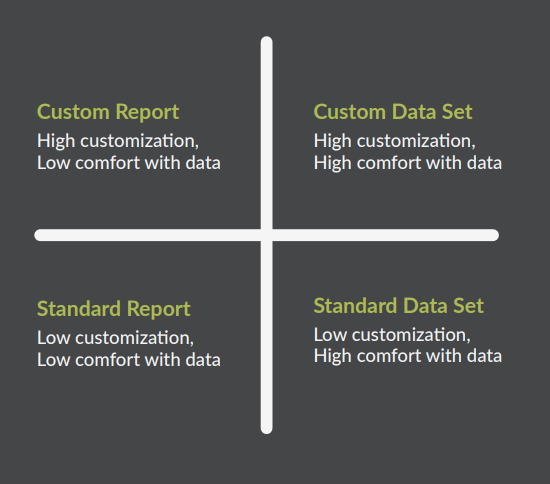As discussed in a previous Query, CIVHC releases data from the Colorado All Payer Claims Database (CO APCD) in two ways:
- Non-public releases, for individuals or organizations to use to improve care for Coloradans.
- Public data, for anyone to use to help make data-driven health decisions.
A later Query will address Public CO APCD data and the steps required to release analyses via civhc.org. Today we are exploring how CIVHC provides non-public data sets and reports to organizations and researchers seeking to lower costs and improve the quality of health care.
Non-Public Data Request Process
If the request meets all necessary criteria, non-public data from the CO APCD is available to “state agencies and private entities in Colorado engaged in efforts to improve health care.” These requests are categorized by CIVHC as non-public, as the data will go to one person or organization, sometimes more, to answer specific research questions or solve particular problems. The information available in all releases of CO APCD data always follow HIPAA and other federal privacy standards, and because of this, it comes with restrictions on how it is used and contractual obligations.
To ensure compliance with these regulations, CIVHC implemented a number of steps in the process of releasing non-public CO APCD data, ranging from deciding the specifics of the ask to completing the Data Use Agreement and being cleared by the Data Release and Review Committee (DRRC). The CO APCD is a powerful trove of information, and CIVHC, as administrator, works diligently to safeguard its contents from misuse by requiring that every requestor completes a thorough application and destruction procedure with each non-public release of data.
Step 1 – Determining the Data
CIVHC releases CO APCD data in different ways, depending on the question(s) the requestor is hoping to answer and their sophistication with data analytics. Health Data Consultants work with them to determine not only the form in which the data will be released but how much protected health information (PHI) is necessary (if any) to complete the analysis. For requestors who would like CIVHC to deliver the data in business intelligence or data visualization tools like Tableau or Excel, Custom and Standard Reports are ideal. When partners are interested in performing their own analyses using tools of their choosing and have a strong data background, the CIVHC team steers them toward a Data Set. Depending on the level of PHI required, the requestor may receive a De-Identified, Limited, or Fully Identifiable Data Set, or one of our Standard Data Sets designed for non-profits, providers, payers and researchers.
Step 2 – The Application
Once the requestor and the Health Data Consultant have narrowed down the request to its final form, they complete an application that is submitted to the CIVHC team for review. CIVHC analysts look over the application to determine the feasibility of answering the research question or solving the stated problem based on what is requested and what is possible with CO APCD data. Estimates of the time and resources required to complete the request are created and are factored into the Data Release Fee documents which then are reviewed with the requestor.

Step 3 – Final Documentation and the DRRC
If the request progresses through the application stage and the requestor signs the Data Release Fee and Data Use Agreement documentation, there are different routes it can take depending on whether it requires PHI. Requests for de-identified and standard CO APCD reports or data sets move on to finalizing mock ups and paperwork prior to moving into delivery with the CIVHC Analyst Team. If the request includes PHI, as in the case of a Limited or Fully-Identifiable data set, the application must be evaluated by the Data Release and Review Committee (DRRC). The DRRC is a multi-partner committee of volunteers who review every non-public request of CO APCD data with PHI to ensure that it meets all state criteria for release as well as all federal privacy regulations prior to moving into production.
Once a request has moved into production, new analyses and data sets typically take between 30 to 60 days for the analysis to be integrated into the workflow and completed, while standard reports and data sets can be delivered in a much shorter time frame.
For more information, view our Non-public Release FAQs, or contact us at ColoradoAPCD@civhc.org to discuss how we can support your project.